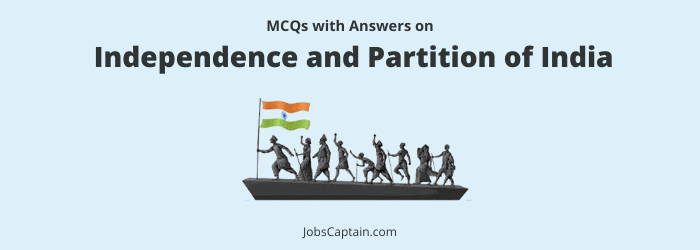
| Test | 1 | 2 |
| Return to | Topic Wise MCQ on Indian National Movement (1885 to 1947) | |
Question 1. Who sang ‘Hindustan Hamara’ of Iqbal and ‘Jan-gan-man’ in the Central Assembly at midnight of 14/15 August 1947?
(A) M.S. Subbulakshmi
(B) Sucheta Kriplani
(C) Meera Ben
(D) Rameshwari Nehru
Question 2. Who appointed the first Prime Minister of India?
(A) Viceroy
(B) Mahatma Gandhi
(C) British Emperor
(D) Governor General
Question 3. Who was the first Governor-General of Independent India?
(A) Lord Mountbatten
(B) Lord Dalhousie
(C) Warren Hastings
(D) C. Rajagopalachari
Question 4. Who was the last Governor-General of Independent India?
(A) Lord Canning
(B) Lord Mountbatten
(C) Rajendra Prasad
(D) C. Rajagopalachari
Question 5. The first Indian to hold office as Governor-General of independent India was______.
(A) B.R. Ambedkar
(B) Dr. Rajendra Prasad
(C) Surinder Nath
(D) Rajagopalachari
Question 6. The first and last Indian GovernorGeneral of India was_________.
(A) Ramanuja Acharya
(B) C. Rajagopalachari
(C) Dr. S. Radhakrishnan
(D) R.M. Gopala
Question 7. Last Viceroy of India was_________.
(A) Achinlake
(B) Lord Linlithgow
(C) Lord Mountbatten
(D) Lord Wavell
Question 8. Who among the following was the first Law Minister of India?
(A) Rafi Ahmad Kidwai
(B) Kailash Nath Katju
(C) Dr. B.R. Ambedkar
(D) M.C. Sitalwad
Question 9. Which one of the following is the correct sequence of persons who occupied the office of the President of India right from beginning?
(A) Rajendra Prasad, S. Radhakrishnan, Zakir Hussain, V.V. Giri
(B) C. Rajagopalachari, Rajendra Prasad, S. Radhakrishnan, Fakhruddin Ali Ahmad
(C) Rajendra Prasad, S. Radhakrishnan, V.V. Giri, Zakir Hussain
(D) C. Rajagopalachari, Rajendra Prasad, Zakir Hussain, V.V. Giri
Question 10. Who represented the Indian National Congress in the Partition Council headed by Lord Mountbatten?
- Abul Kalam Azad
- Jawaharlal Nehru
- Sardar Patel
- Rajendra Prasad
Select the correct answer from the code given below.
(A) 1 and 4
(B) 3 and 4
(C) 2 and 3
(D) 1 and 2
Question 11. The President of Indian National Congress at the time of partition of India was________.
(A) Maulana Abul Kalam Azad
(B) Jawaharlal Nehru
(C) J.B. Kripalani
(D) C. Rajagopalachari
Question 12. Who among the following was the President of the Indian National Congress on 15th August 1947?
(A) Sardar Patel
(B) J.B. Kripalani
(C) Jawaharlal Nehru
(D) Rajendra Prasad
Question 13. Who presided over the 1946 Session of the Indian National Congress held at Meerut?
(A) B. Pattabhi Sitaramayya
(B) Dr. Rajendra Prasad
(C) Maulana Abul Kalam Azad
(D) J.B. Kripalani
Question 14. Who was the Congress President at the time of transfer of power in 1947 to India by the British?
(A) J.B. Kripalani
(B) Abul Kalam Azad
(C) Rajendra Prasad
(D) Jawaharlal Nehru
Question 15. In August 1947, who of the following leaders did not participate anywhere in Independence Day celebrations?
(A) Rajendra Prasad
(B) Vallabhbhai Patel
(C) Mahatma Gandhi
(D) Jawaharlal Nehru
Question 16. 26 January, 1950 had chosen for the enforcement of the Constitution because_________.
(A) This was an auspicious day
(B) Congress had celebrated 26 January, 1930 as the first Independence Day
(C) ‘Quit India Movement’ was begun on this date in 1942
(D) None of the above
Question 17. ‘Indian Nationalism was the child of the British Rule’. Who made this statement?
(A) P.E. Roberts
(B) R.C. Majumdar
(C) R. Coupland
(D) Bipin Chandra
Question 18. Who among the following said that ‘the most notable achievement of the British Rule was the unification of India’?
(A) Yogendra Singh
(B) Rajni Kothari
(C) M.N. Srinivas
(D) K.M. Panikkar
Question 19.
- Assertion (A): Britain made India free in 1947.
- Reason (R): Britain had become weak during the second World War.
In the context of the above two statements, which of the following is/are correct?
(A) (A) is false, but (R) is true
(B) (A) is true, but (R) is false
(C) Both (A) and (R) are true, but (R) is not the correct explanation of (A)
(D) Both (A) and (R) are true and (R) is the correct explanation of (A)
Question 20. Given below are two statements, one labelled as Assertion (A) and the other labelled as Reason (R).
- Assertion (A): The British sovereignty continued to exist in free India.
- Reason (R): The British sovereign appointment the last Governor General of free India.
In the context of the above two statements, which one of the following is correct?
(A) (A) is false, but (R) is true
(B) (A) is true, but (R) is false
(C) Both (A) and (R) are true, but (R) is not the correct explanation of (A)
(D) Both (A) and (R) are true and (R) is the correct explanation of (A)
Question 21.
- Assertion (A): The Indian National Congress accepted the Mountbatten plan.
- Reason (R): It believed in twonation theory.
Select the correct answer from the code given below.
(A) (A) is false, but (R) is true
(B) (A) is true, but (R) is false
(C) Both (A) and (R) are true, but (R) is not the correct explanation of (A)
(D) Both (A) and (R) are true and (R) is the correct explanation of (A)
| Test | 1 | 2 |
| Return to | Topic Wise MCQ on Indian National Movement (1885 to 1947) | |
